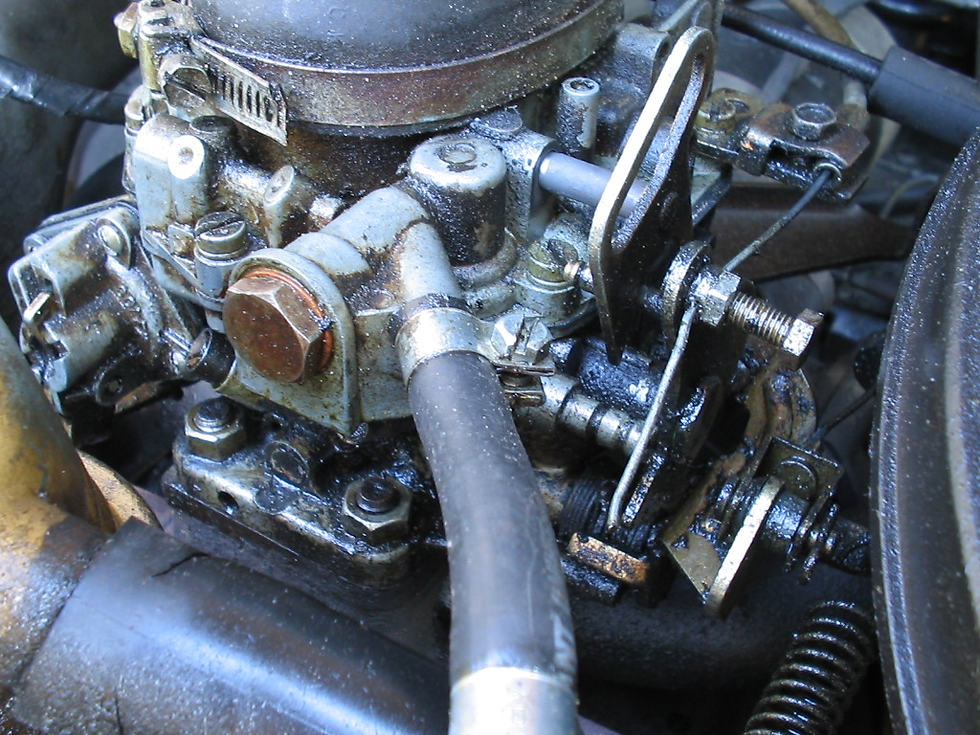The Carburetor: History, Operation, and Legacy in the Automotive Industry
- Quality Auto & Body

- 29 abr 2024
- 3 Min. de lectura
The carburetor, a vital component in the operation of internal combustion engines for over a century, has left an indelible mark on the history of automotive engineering. From its humble beginnings to its eventual decline in the face of more advanced technologies, the carburetor has witnessed and participated in the evolution of motor vehicles. In this extensive exploration, we will delve into the origins, internal workings, innovations, and lasting legacy of the carburetor in the automotive industry.
I. Origins of the Carburetor
The carburetor has its roots in the early days of the automotive era, when pioneers of motorized transportation sought an efficient way to mix air and fuel to power their machines. By the late 19th century, inventors such as Gottlieb Daimler and Karl Benz were experimenting with various methods to fuel their internal combustion engines, and it was through the invention of the carburetor that a crucial step forward was taken.
II. Internal Operation of the Carburetor
To fully understand the significance of the carburetor, it is essential to break down its internal operation. At its most basic form, a carburetor is a device that mixes air and fuel in proper proportions for combustion in the engine. This process involves a series of key components, including the diffuser, the venturi, the throttle valve, and the fuel circuits.
III. Evolution and Improvements in Carburetor Design
Throughout its history, the carburetor has undergone numerous improvements and evolutions in its design to adapt to the changing demands of the automotive industry and government regulations. From single-action carburetors to more sophisticated models with multiple fuel circuits, each iteration sought to improve the efficiency, power, and fuel economy of vehicles.
IV. The Carburetor and the Golden Age of the Automobile
During the first half of the 20th century, the carburetor reached its peak of popularity and utility. With the advent of mass automobile production and the growth of the automotive industry, carburetors became a standard feature in most vehicles. This golden age saw the rise of iconic carburetor brands such as Stromberg, Zenith, and SU, which dominated the market with their innovations and designs.
V. Decline and Replacement by Fuel Injection
As the 20th century progressed, the carburetor began to lose ground to the emerging technology of fuel injection. Although carburetors were still widely used in many vehicles, especially in the more economical car markets, fuel injection offered significant advantages in terms of efficiency, emission control, and performance.

VI. Legacy and Persistence of the Carburetor
Despite its decline in popularity, the carburetor remains an integral part of the legacy of the automotive industry. For classic car enthusiasts and mechanical aficionados, carburetors represent a bygone era of mechanical engineering and automotive design. Additionally, in some regions of the world, carburetors are still used in low-power vehicles and specialized applications where simplicity and reliability are paramount.
VII. Conclusions
In conclusion, the carburetor has played a crucial role in the history and evolution of the automotive industry. From its humble beginnings to its eventual replacement by more advanced technologies, the carburetor has left a lasting mark on the world of motor vehicles. Its legacy endures in the memories of classic car enthusiasts and in the very history of mechanical engineering. Although its golden age may have come to an end, the carburetor will continue to be remembered as a fundamental piece in the puzzle of the internal combustion engine.









Comentarios